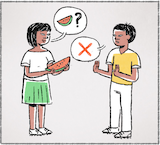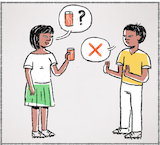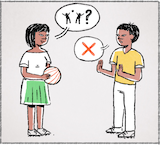


พุหญิงเขากำลังเฮ็ดหญัง เขากำลังซวนพุซายกินบักแตงโมอยู่
แล้วเขาซวนพุซายว่าจั่งใด อันนี้กะบ่ฮู้คือกัน จักว่าเขาซวนพุซายจั่งใด เขาอาดสิซวนว่า กินบักแตงโมบ่ กินบักแตงโมนำเฮาบ่
แล้วพุซายตอบว่าจั่งใด พอพุซายได้ญินนั้น อันนี้กะบ่ฮู้คือกัน เห็นแต่เคี้ยงหมายกากะบาด เขาอาดสิบ่กิน หลืออาดสิส่ายหน้า เขาอาดสิตอบว่า บ่ บ่กินดอก บ่เป็นหญัง เขากะอาดสิเว้าปะมานนี้
อันนี้เป็นผนละไม้อี่หยังเกาะ ที่เขาซวนพุซายกิน เป็นบักแตงโม เป็นแตงโม
แตงโมมีลดซาดจั่งใด แตงโมกะมีลดซาดหวาน หวานคัก แต่ว่าบ่หวานหลายดอก แต่ว่ากะแซบ คนส่วนมากสิมักกินแตงโม
แตงโมมีในบ่ กะมีอยู่ แตงโมมีในพ้อม มันมีในหลาย แตงโมมันมีในอยู่ในน่วยของมันนั้นหละ
เป็นหญังพุซายคนนี้เขาคือบ่กินแตงโมนำพุหญิง เขาอาดสิบ่หิว หลืออาดสิบ่อยาก เขากะเลยบ่กิน เขาอาดสิบ่มักกะได้ เขากะเลยปะติเสด เขากะเลยบ่เอา เขากะเลยบ่กินนำพุหญิงคนนี้
19
นี้คืออี่หยัง อันนี้กะเป็นพุหญิงคนเก่านั้นหละ เขากำลังซวนพุซายกินน้ำอัดลมอยู่
เป็นหญังเขาคือซวนพุซายกินน้ำอัดลมขวดนี้ อันนี้กะบ่ฮู้คือกัน เขาอาดสิมัก หลืออยากให้คนนี้กินนำกะได้ เขากะเลยซวนกิน
เขากะอาดสิซวนว่า กินน้ำอัดลมนำเฮาบ่ กินน้ำอันนี้นำเฮาบ่ เขากะอาดสิซวนปะมานนี้
น้ำที่เขาซวน หลือสิให้พุซายกินนี้ เป็นน้ำอี่หยังเกาะ กะเป็นน้ำอัดลม เป็นน้ำกะปอง เป็นน้ำกะปองอัดลมนี้หละ
น้ำกะปองอัดลมนี้มีลดซาดจั่งใด น้ำกะปองอัดลมนี้กะมีลดซาดหวาน หลือลดซาดซ้า เป็นน้ำที่ซ้า แล้วกะเฮ็ดให้สดซื้นขั้นเฮากินแล้ว
เป็นหญังพุซายคนนี้เขาคือบ่กินน้ำนำพุหญิงคนนี้ เขากะอาดสิบ่มัก หลืออาดสิบ่มักกินน้ำอัดลมอันนี้ เขากะเลยบ่กิน เขากะเลยปะติเสดกะได้
20
เขากำลังเฮ็ดหญังอยู่ กะมีพุหญิงคนหนึ่ง เขากำลังซวนพุซายเหล้นลูกบอนอยู่
เขาอาดสิซวนไปว่า เหล้นลูกบอนบ่ เหล้นลูกบอนนำเฮาบ่ มาเหล้นลูกบอนนำเฮาบ่
ของที่เขาถืออยู่หั้นเป็นลูกบอนหลือเป็นอี่หยังเกาะ กะเป็นลูกบอนนั้นหละ เป็นลูกบอนลูกวงกม น่วยบ่ใหญ่หลาย น่วยพอดี เขากำลังจับอยู่
ลูกบอนอันนี้ใซ้เหล้นจั่งใด ลูกบอนอันนี้กะใซ้เหล้น เอาไว้ถ้าเตะ เอาไว้ถ้าตี เอาไว้ถ้าโญน เอาไว้ถ้าเหล้นจั่งใดกะได้ แล้วแต่เฮาสามาดสิเหล้น
เป็นหญังพุซายคนนี้คือบ่เหล้นลูกบอนกับพุหญิงคนนี้ เขากะอาดสิบ่มัก หลือเหล้นบ่เป็น หลือบ่อยากเหล้นกะได้ หลือบ่มีอาลมเหล้นกะได้ เขากะเลยบ่เหล้น เขากะเลยปะติเสดพุหญิงคนนี้ไป
Link to overview page
Link to dictionary
| Isaan | Pronunciation | Tones | Thai | English/Notes |
|---|---|---|---|---|
| พุหญิง | phu-ɲiŋ | H-M | ผู้หญิง | woman, female |
| เขา | khao | M | เขา | personal pronoun: he, she |
| กำลัง | gam-laŋ | M-HR | กำลัง | auxiliary indicating continuous or progressive action |
| เฮ็ด | het | H | ทำ | to do, to make |
| หญัง | ɲaŋ | M | อะไร, เป็นหญัง = ทำไม | 1. what {เขากำลังเฮ็ดหญัง = What is he doing?} {ธูปเอาไว้เฮ็ดหญัง = What are incense sticks for?} 2. something, anything, (nothing) 3. เป็นหญัง[...]คือ in initial position: why {เป็นหญังเขาคือใส่บักพิกลงไปในกวยเตียว = Why is he putting chili in [his] noodle soup?} {เป็นหญังหน้าต่างมันคือเปิด = Why is the window open?} {เป็นหญังมันคือมีควนไฟ = Why is there smoke?} |
| ซวน | su:an | HR | ชวน | to invite {เขาซวนพุซายเหล้นบ่าด = (s)he invites the boy to play basketball} |
| พุซาย | phu-sa:i | H-HR | ผู้ชาย | man, male |
| กิน | gin | M | กิน | to eat, to consume, to use |
| บักแตงโม | bak-tɛ:ŋ-mo: | M-M-HR | แตงโม | watermelon |
| อยู่ | yu: | H | อยู่ | 1. to be (located) at 2. yet, still 3. auxiliary indicating continuous or progressive action {ทอดปาอยู่ในกะทะ = (in the process of) frying a fish in the pan} {แม่กำลังเมี้ยนเฮียนอยู่ = mother is cleaning/tidying up the house} |
| แล้ว | lɛ:o | HF | แล้ว | 1. finished 2. already 3. and then, and next (especially แล้วกะ) 4. auxiliary for past tense |
| ว่า | wa: | H | ว่า | 1. that, as {คำว่า X = the word X} 2. to say |
| จั่งใด | jaŋ-dai | H-M | ยังไง, แบบไหน | how, in what manner {บักนาวมันมีลดซาดจั่งใด = Lime fruits have what kind of taste?} {เขาปิดแอจั่งใด = How is he switching off the A/C?} {เทียนใซ้จั่งใด = How's a candle used?} {สิใซ้จั่งใด = how is [it] used?} |
| อัน | an | M | อัน | 1. thing, object 2. general clf. for objects |
| นี้ | ni: | HF | นี้ | 1. this 2. here |
| กะ | ga | M | ก็ | 1. then, consequently 2. also |
| บ่ | bɔ: | H | ไม่ | 1. no, not 2. question particle, transforming a statement into a question Notes: spelling exception in line with common usage on social media |
| ฮู้ | hu: | HF | รู้ | 1. to know 2. to understand Notes: equivalent to ลู้ |
| คือกัน | khʉ:-gan | HR-M | เหมือนกัน | 1. also, likewise, similarly {ยินดีที่ได้ฮู้จักคือกันคับ = Nice to meet you too!} 2. in negative sentences: either {บ่ลู้คือกัน = I don't know either} {จักคือกัน = I don't know (either)} |
| จัก | jak | M | จัก | 1. answer to a question: [I] don't know, don't know exactly, [I'm] not sure {พุซายคนนี้เขาเถ้าไป่ จัก จักเถ้าหลือบ่เถ้า เบิ่งบ่ค่อยออก = Is this man here already old? I don't know. I can't see clearly whether he's old or not.} {เขาเว้ากันอยู่ใส จักคือกัน = Where are they talking? I don't know either.} 2. exact(ly), what exactly {จักต้มอี่หยังกะบ่ฮู้ = I don't know what (exactly) he is cooking} {บ่ลู้คือกันจักปาอี่หยัง = I don't know either what kind of fish this is} 3. how much/many? {ต้นไม้มีจักต้น = How many trees are there?} {ตอนนี้จักโมงแล้ว = What time is it now?} {มือของเฮานี้สิมีจักนิ้ว = How many fingers do our hands have?} 4. a bit, a little bit {จักหน่อย/จักหน่อยหนึ่ง = a bit, a little bit} |
| อาด | a:t | LF | อาจ | 1. might, may, will 2. likely |
| สิ | si | M | จะ | future tense auxiliary {เขากำลังสิตื่น = he's about to wake up} {สิไปตะหลาด = [I'm] going to the market} |
| นำ | nam | HR | 1. at, in 2. with, together with {บ่สามาดถือไปนำได้ = [you] can't carry it around} {กินบักแตงโมนำเฮาบ่ = Will you eat watermelon with me?} 3. to lead, to accompany, to go with {เด็กน้อยญ่างไปนำแม่ = the daughter follows her mother} |
|
| เฮา | hao | HR | เรา | 1. personal pronoun: we 2. personal pronoun: I |
| ตอบ | tɔ:p | LF | ตอบ | to answer, to respond, to reply |
| พอ | phɔ: | HR | พอ | 1. just when, just after, as soon as 2. enough, adequate |
| ได้ญิน | dai-ɲin | HF-HR | ได้ยิน | to hear |
| นั้น | nan | HF | นั้น | that, there |
| เห็น | hen | M | เห็น | to see |
| แต่ | tɛ: | H | แต่ | 1. but {แต่บ่ต่างกันหลาย = but not very different} {แต่บ่ลู้ว่าเขาญ่างมาแต่ใส = but [I] don't know where he's coming from, see also: แต่ว่า} 2. only {ตอนนี้มีแต่ขี้ฝ้า = now there are only clouds} |
| เคี้ยงหมาย | khi:aŋ-ma:i | HF-M | เครื่องหมาย | symbol Notes: pronunciation: also realized as เคื้องหมาย |
| กากะบาด | ga:-ga-ba:t | M-M-LF | กากบาท | cross, plus or x sign |
| หลือ | lʉ: | M | หรือ | or |
| ส่าย | sa:i | H | ส่าย | to shake, to swing {ส่ายหน้า = to shake one's head} |
| หน้า | na: | LF | หน้า | 1. front {ปะตูหน้า = front door} 2. face {เขากำลังล้างหน้า = he's washing his face} 3. auxiliary: conditional tense {เขาหน้าสิเป็นพุบ่าวพุสาวกัน = they are probably groom and bride} {กะหน้าสิส้มอยู่ = it's likely to be sour} 4. season {หน้าฮ้อน = hot season} 5. page 6. clf. for pages {เฮาอ่านฮอดหน้านั้นแล้ว = we've read until this page} |
| ดอก | dɔ:k | LF | หรอก, ดอก | 1. particle used after a negative, relativizing or explanatory statement to make the sense milder {กินเข้าบ่ บ่กินดอก = Are you going to eat [with us]? No.} {เป็นก้อนสี่เหลี่ยม ก้อนน้อยๆ ดอก = These are cubes, small cubes.} {แล้วกะมีลดคันหนึ่งขี่ผ่านมา เป็นลดเก็งดอก = And there's a car passing, a sedan.} 2. particle used to emphasize (not necessarily a negative) contrast 3. particle used for emphasis {ดอกไม้นี้งามบ่ กะงามอยู่ เบิ่งงามๆ ดอก = Is this flower beautiful? Yes, it's beautiful, it looks beautiful} |
| เป็น | pen | M | เป็น | 1. to be, to exist 2. to be able to 3. to suffer, sth. happens to 4. เป็นหญัง[...]คือ in initial position: why? {เป็นหญังเขากะคือแปงฟัน = Why is he brushing his teeth?} {เป็นหญังเคี่ยงบินมันคือสิตก = Why is the airplane falling down?} |
| เว้า | wao | HF | พูด | to say, to speak, to talk |
| ปะมาน | pa-ma:n | M-HR | ประมาณ | 1. about, approximatively 2. to guess, to estimate |
| ผนละไม้ | phon-la-mai | M-H-HF | ผลไม้ | fruit |
| อี่หยัง | i:-yaŋ | H-M | อะไร | 1. what {นี้คืออี่หยัง = What is this?} {มื้อนี้เจ้าเฮ็ดอี่หยัง = What are you doing today?} {กินเข้างายกับอี่หยัง = What did you have for breakfast?} 2. something, anything, (in negations) nothing {บ่ต้องเฮ็ดอี่หยังอีกเลยนอกจากใส่ปุย = [we] don't need to do anything besides adding fertilizer} |
| เกาะ | gɔ | M | น่ะ, หรอ, เหรอ | final particle expressing a question or similar |
| ที่ | thi: | H | ที่ | 1. that, which {คนที่ยืนอยู่ฝั่งขวา = the person which is standing on the right = the person standing on the right} {เว้าคำที่บ่สุพาบ = to speak words which are impolite = to speak impolitely} 2. for ordinal numbers {ที่สาม = third} |
| แตงโม | tɛ:ŋ-mo: | M-HR | แตงโม | watermelon |
| มี | mi: | HR | มี | 1. to have 2. there is |
| ลดซาด | lot-sa:t | H-HF | รสชาติ | taste Notes: pronunciation: also realized as ลดชาด |
| หวาน | wa:n | M | หวาน | sweet |
| คัก | khak | H | intensifier: very, very much | |
| แต่ว่า | tɛ:-wa: | H-H | แต่ว่า | 1. but 2. only {ฮู้แต่ว่าเขายืนอยู่พุเดียว = I only know that he's standing there by himself} |
| หลาย | la:i | M | เยอะ, มาก | many, much, very |
| แซบ | sɛ:p | HF | อร่อย | 1. food: tasty {กวยเตียวมันแซบบ่ = Is the noodle soup tasty?} 2. sleep: well {เป็นตานอนแซบคัก = it looks as if she's sleeping very well} |
| คน | khon | HR | คน | person, people |
| ส่วนมาก | su:an-ma:k | H-HF | ส่วนมาก | mostly, usually, generally |
| มัก | mak | H | ชอบ | to like, to love, to want, to desire |
| ใน | nai | HR | เมล็ด | seed or stone of a fruit |
| พ้อม | phɔ:m | HF | พร้อม | at the same time, also, too {มีตะเว็นพ้อม = the sun's out, too} {กะทะมีด้ามพ้อม = the pan has also a handle} |
| มัน | man | HR | มัน | it (also used to refer to people) |
| ใน | nai | HR | ใน | in, within |
| น่วย | nu:ai | H | ลูก, ผล | clf. for the fruits (e.g., banana, coconut, lime, papaya, watermelon), vegetables (e.g., chilis), eggs, mountains, the sun |
| ของ | khɔ:ŋ | M | ของ | of, belonging to |
| นั้นหละ | nan-la | HF-M | นั่นแหละ | auxiliary for emphasis at the end of a phrase |
| คือ | khʉ: | HR | คือ | 1. to be, to resemble, like, as 2. why {บักหล้าคือบ่เก็บโต่ะแน่ = [addressing a young boy] Why haven't you cleared the table?} |
| หิว | hiu | M | หิว | hungry, to crave (food, water, sleep etc.) {หิวนอน = to be tired} {หิวน้ำ = to be thirsty} {หิวเข้า = to be hungry} |
| อยาก | ya:k | LF | อยาก | to want, to wish |
| เลย | lə:i | HR | เลย | 1. futher on, beyond, past {เข็มน้อยเลยเลขสิบสองไป = the minute hand has passed number twelve} 2. too much 3. at all 4. definitively 5. completely, utterly |
| ได้ | dai | HF | ได้ | 1. can 2. to get, to obtain 3. before verb: indicating past tense 4. บ่ได้ + verb: not |
| ปะติเสด | pa-ti-se:t | M-M-LF | ปฏิเสธ | to decline, to refuse, to deny |
| เอา | ao | M | เอา | to take, to give {เขากำลังเอาก่องไปซั่ง = he's taking the boxes to weigh them} {หมอกำลังเอายาให้คนป่วยกิน = the doctor is giving medicine to the patient} {เอาไว้ถ้า = is for, is used for, has the purpose of} |
| เก่า | gao | H | เก่า | old |
| น้ำอัดลม | na:m-at-lom | HF-M-HR | น้ำอัดลม | soft drink |
| ขวด | khu:at | LF | ขวด | bottle |
| ให้ | hai | LF | ให้ | 1. to give {หมอกำลังเอายาให้คนป่วยกิน = the doctor is giving the patient medicine} 2. for 3. to allow, to be allowed |
| น้ำ | na:m | HF | น้ำ | 1. water 2. drink, soft drink, juice |
| กะปอง | ga-pɔŋ | M-M | กระป๋อง | can |
| อัด | at | M | อัด | to pack, to squeeze, to compress |
| ลม | lom | HR | ลม | wind |
| นี้หละ | ni:-la | HF-M | นี่แหละ | auxiliary for emphasis at the end of a phrase |
| ซ้า | sa: | HF | ซ่า | to tingle, to sparkle |
| สดซื้น | sot-sʉ:n | M-HF | สดชื่น | fresh, refreshed Notes: pronunciation: also realized as สดชื้น |
| ขั้น | khan | LF | เมื่อ | when, if |
| หนึ่ง | nʉŋ | H | หนึ่ง | 1. one 2. after adjective: intensifier {บักคักหนึ่ง = very much} {อันบักใหญ่หนึ่ง = very large}, or attenuates the meaning {กะดาดมันแผ่นน้อยๆ หนึ่ง = the piece of paper is [relatively] small} |
| เหล้น | len | LF | เล่น | 1. to play, to enjoy oneself with, to do something for pleasure {เหล้นลูกบอน = to play ball} {เหล้นเกม = to play a game/games} {เหล้นน้ำ = to play with/in the water} {นั่งเหล้น = to sit} {กินเหล้น = to eat (as a snack), to snack} {เหล้นโน่ดบุ่ก = to use a laptop (for entertainment or work)} 2. to drop by, to spend time with, to come to visit {บ่ได้มาเฮ็ดหญัง มาเหล้นซื่อๆ = I've not come to do anything in particular, I'm just dropping by} |
| ลูกบอน | lu:k-bɔ:n | HF-M | ลูกบอล | ball |
| ไป | pai | M | ไป | 1. to go 2. auxiliary indicating action extending into the future |
| มา | ma: | HR | มา | 1. to come 2. auxiliary expressing action towards the present or focal time {กะคุเฮ็ดมาจากอี่หยัง = What is the bucket made of?} {แล้วเขากะเก็บเงินจากพุนั้นมา = and then she takes the money of that person} |
| ของ | khɔ:ŋ | M | ของ | thing, object |
| ถือ | thʉ: | M | ถือ | 1. to hold 2. to carry 3. to regard as, to consider {สี่สิบองสาถือว่าฮ้อน = 40 degrees Celsius is considered hot} |
| หั้น | han | LF | ที่นั่น | there, over there |
| ลูก | lu:k | HF | ลูก | 1. child 2. clf. for balls, fruits (lime), mountains |
| วงกม | woŋ-gom | HR-M | วงกลม | 1. circle, ring, sphere 2. round |
| ใหญ่ | ɲai | H | ใหญ่ | large, big |
| พอดี | phɔ:-di: | HR-M | พอดี | 1. to fit well 2. appropriate, just enough, just right {กะจกบานบ่ใหญ่ กะจกบานพอดี = not a large window, just right} {พอดีมือของเฮา = just right for his hand} 3. just in time, at the right moment, just this moment {แล้วพุซายคนนี้กะญ่างมาพอดี = and the man has come just now} |
| จับ | jap | M | จับ | 1. to grasp, to hold {เขาจับมือกัน = they're holding hands} {เขายืนจับไอติมอยู่ = she's standing, holding an ice cream} 2. to catch, to arrest {จับพุล้าย = to arrest a criminal} |
| ใซ้ | sai | HF | ใช้ | to use |
| ไว้ถ้า | wai-tha: | HF-LF | usually in a positive statement or answer: is for, is used for, has the purpose of {กะทะมีไว้ถ้าทอด = a pan is for frying} {น้ำบักนาวมีไว้ถ้าปุงอาหาน = lime juice is used to season food} {ปากกามีไว้ถ้าเขียน = a pen is for writing} {กะเทียมเอาไว้ถ้าเฮ็ดแนวกิน = garlic is used to make food} {ขาเอาไว้ถ้าญ่าง = legs are for walking} {เกิบเอาไว้ถ้าใส่ = shoes are for wearing} Notes: see also ไว้ |
|
| เตะ | te | M | เตะ | to kick with the foot |
| ตี | ti: | M | ตี | 1. to hit 2. an hour counting after midnight {ตีห้า = 5 a.m.} |
| โญน | ɲo:n | HR | โยน | to throw, to toss {โญนลูกบอน = to throw a ball} |
| แล้วแต่ | lɛ:o-tɛ: | HF-H | แล้วแต่ | up to, depending on |
| สามาด | sa:-ma:t | M-HF | สามารถ | can, to be able |
| กับ | gap | M | กับ | 1. and {ลุงกับป้า = uncle and aunt} {กวยเตียวหมูกับกวยเตียวไก่ = noodle soup with pork and noodle soup with chicken} 2. with, to {ค้ายๆ กับคำว่า ... = similar to the word ...} 3. prefix in front of foods {กับเข้า = side dishes eaten with rice} {เขากินกับกวยเตียว = he's eating noodle soup} |
| อาลม | a:-lom | M-HR | อารมณ์ | temper, feeling, mood, emotion |